
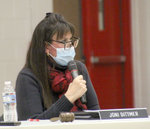
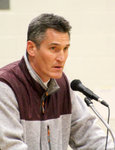
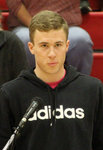
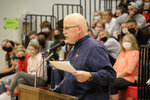
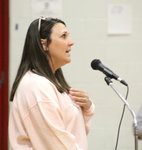
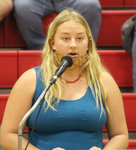
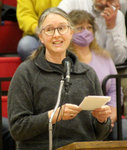
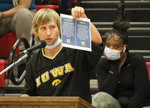
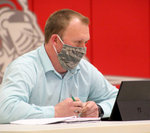

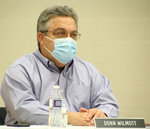

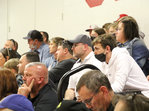
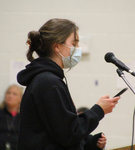
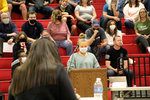
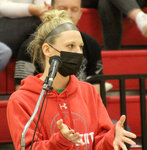
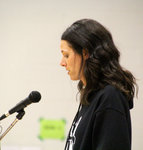
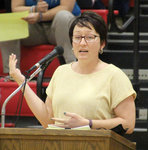
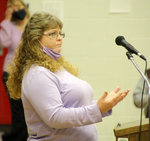
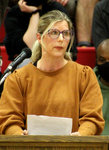
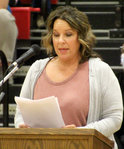
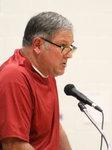
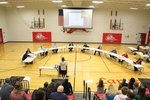
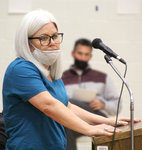
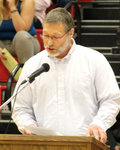
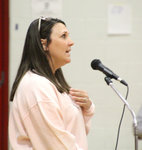
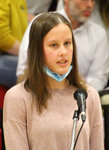
More than 300 filled North Scott junior high bleachers Monday night to hear about 30 students and parents react to diversity lessons that some lauded for uniting, and others blamed for dividing the community.
Thirteen raised clear concerns and 15 generally commended the district. But almost all agreed the district communicated poorly about the lessons, and especially about racist bullying at the junior high that prompted administrators to hold a special assembly Monday, April 5.
(Link to North Scott Community School District Facebook posts of board meeting videos.)
Months-long bullying of a black girl by white boys led to several suspensions, and principal John Hawley’s decision to hold the assembly.
Parents’ complaints about that assembly, and an unrelated high school writing assignment by English teacher Jennifer Sambdman, prompted the school board to schedule the open forum at the junior high, the first live board meeting in nearly a year. Hundreds more watched and posted comments to a Facebook live stream.
Six board members distanced at tables in an arc across the gym floor, listened silently for two hours, as board chairman Joni Dittmer thanked and encouraged all who spoke. Board member Molly Bergfeld is away for work and listened online.
Afterward, Dittmer said she was “floored” by the passion from all sides. “Everyone here cares deeply about our kiddos. We’re very appreciative we had this many people who came.”
She said the board was aware of, but did not get involved in the junior high bullying that prompted the special assembly. She said superintendent Joe Stutting, not the board, manages personnel and curriculum. “We trust him and have faith in him that he’s caring, and listens.”
Dittmer said the board will “process all the information and will provide positive direction and resolution that will be the best for all in the North Scott school district.”
Most students heeded signs requiring masks at all times in the building. Most adults ignored them, as well as instructions by deputy superintendent Michael Kline who asked all entering to wear masks.
Many adults also ignored Stutting’s request and reminders to refrain from applause, at one time applauding after his request to stop.
Junior high concerns
Most speakers raised concerns about a portion of the junior high assembly where students were given a 25-question verbal-privilege quiz that asked them to add or deduct points based on personal experiences. Students gave themselves a point if their families had health insurance, or parents had a college degree, or if they “move through the world without fear of sexual assault.”
Students deducted a point for other experiences, like having a disability, or feeling unsafe walking alone at night, or having a parent too busy to spend time with them.
Parent Katie Hoyt welcomed the instruction.
“Due to race-related issues going on recently in the schools, I believe it was absolutely appropriate for them to address racism, inclusion, empathy, equity and privilege,” said Hoyt, mother of a junior high student. “I’m proud to live in a district that teaches more than core curriculum.”
Parent Melissa Meggers said she supports diversity, but was appalled the district proceeded without parent support, or even disclosure. “I have to sign something stating my kids can take Tylenol in school. I have to sign something saying they can have their picture taken at a field trip…” she said. “The fact that this was kept secret and away from the parents’ knowledge of it is my issue. I firmly believe that that is inciting difference.”
Parent Neal Keppy said the privilege quiz was the wrong tactic.
“I think respect, unity, hard work, kindness and grace are important things we should be teaching. But privilege is not good. Kids don’t choose privilege. It’s divisive, not good for anyone.”
Those identified as privileged “are made to feel guilty,” he said. Those identified as underprivileged “are maybe made to feel like the victim, or possibly jealous that the world is against them. All that does is divide. You see I’m not wearing a mask so you can see my facial expression. Since you’re all six feet apart, I wish you would take your masks off so I can see your facial expressions.”
Tricia Poole said she had no kids in the class, but called and asked for a video of the presentation. She said it was uncomfortable, but thought provoking. “My husband, my children and I had great discussion. Faculty and teachers saw a gap in safety and how students were feeling, and they created something they thought needed to be addressed.”
Topics left some students ashamed
Lucas Radech, from Long Grove, asked for a formal investigation into the junior high assembly, which he said was too mature for adolescents. “Seventh-grade students reported being confused, embarrassed, ashamed, discouraged. It was all about the delivery method for regarding their privilege scores and how it relates to bullying and racism, most of which they’re not involved in at all.
“Our collective concern is about teaching privilege to 12- and 13-year-old children to examine their own implicit bias, is developmentally too advanced and inappropriate as well as not ethically supported by the North Scott code of professional conduct.”
He quoted parts of the code that forbid any activity that “repeatedly exposes students or other practitioners to unnecessary embarrassment or disparagement.”
“Our community fully supports diversity, inclusion, respect and tolerance for all people, regardless, period. We demand the public school exclude political propaganda as a tool to try to indoctrinate our students with politically loaded and inflammatory ideas.”
Parent Abby Petersen agreed that “political ideology should not be interjected into our children’s education. When they stray, we should be told about it in a timely manner. The issues happening in junior high should absolutely be addressed.”
She said the district should have posted the lesson for all to see. “I’d like to hear what kids heard. I believe we should be told what is being told to our kids, especially if this is not approved curriculum,” she said, to loud applause.
A seventh-grader identified himself as one of the junior high students suspended for bullying. He said the assembly left him feeling bullied. “Personally, I felt targeted. After the assembly, I felt upset and felt targeted along with a lot more students … “Girls called me racist names and they didn’t get in trouble for it,” he said. “Racism goes both ways, and this is not being recognized.”
His comments drew applause, too.
In an interview before Monday’s meeting, Stutting said staff called the assembly not only because of the bullying, but because students kept quiet about it.
“Based on the lack of empathy and racist types of comments and social media posts, we needed to do something to get more empathy and understanding on behalf of seventh-graders. Everyone agrees we need to do those kinds of things. But the means and types of lesson became a debate.”
High school class concerns
A group of about 20 students sat together with signs supporting Sambdman, the teacher who used an exercise called the “oatmeal essay” that challenged students to scrutinize their own beliefs. Those who spoke said they were clear the assignment was voluntary, and intended to provoke thought, not beliefs.
The district intervened after some parents complained to school board members about the lesson.
“We found that the list used in the assignment was not appropriate. In hindsight, we should have also provided parent notification proactively before the lesson started,” Stutting wrote to parents last week.
The students who spoke commended the exercise.
“I was one of the kids who wrote the infamous oatmeal essay,” Ava Garrard said. “Jennifer Sambdman taught us about bias. She taught us how we all have it, and how to identify it so we wouldn’t fall victim to the grossness it brings out in all of us.
“She made it clear that she would not skew our beliefs as to conform with her own, and she did not pressure us to share our beliefs with her. We did not have to show her the list we wrote our stances on and urged us to not write our names on them.”
Sambdman “has perfected the art of talking about both sides, to the point that I would have no idea what she was thinking if you asked me,” student Kylie Duhacheck said. “All of us students here tonight have different political views and morals, which just goes to prove that no viewpoint was being forced on anyone. The point of school is to learn and challenge our minds. If we never hear the opposing side, then how do we grow as individuals?”
Parent Valerie Connor, an ethics professor, lauded Sambdman for her initiative, and condemned the district for using the forum to link the high school class with the junior high incident.
“I would personally like to thank Ms. Sambdman for her dedication to her students and their success,” Connor said. “But aligning this assignment with activities that occurred at the junior high resulted in undue stress to students, and specifically, to Ms. Sambdman.”
Students Alex Dickman and Faith Rains said they chose essay topics that challenged their own beliefs and learned from the experience.
“The point of this essay was for students to challenge their beliefs by choosing a topic that they felt strongly about and felt was not a true statement,” Dickman said. “I did my essay on the statement that was, ‘more guns to not stop crimes – they actually impose more of a danger.’ … Personally I would consider myself more of a conservative-leaning person, and even the statements … that may have seemed like they were from liberal’s perspective did not bother me. All of us students being here tonight is not at all about politics, but completely about being here to support one of the best teachers at North Scott High School.”
Rains said she researched and wrote an essay challenging her personal belief about gender.
“While reading all these articles, my opinion has not changed at all. I still believe they are the same and that they should only be able to identify themselves as male or female. I do not agree with the articles I have read, but I do understand what they are trying to say,” Rains said. “I have learned to open my eyes to others views, but I will not change my mind on how I feel.”
Parent Pete Drahozal said both incidents are part of the same problem.
“Under today’s political climate, everything is political. And that includes what’s going on in both of the buildings. It’s being done by ideologues, activists on the left, and they’re every bit as political as what I have to say.
“A culture war is raging on around us, obviously. Claiming victim status doesn’t necessarily make you virtuous.”
Former school board member Nick Hansel agreed, emphasizing parents should take the lead with their children’s cultural and social education.
"White fragility, black fragility, and loving your neighbor as yourself should be resolved by the parent, not the teacher. Micro aggressions and major aggressions should be addressed at home and addressed at school individually when needed. We’re not providing a neutral environment for our students. We need public schools,” Hansel said. “We need a socially and politically neutral learning environment. This isn’t California. This is Iowa.”
Hansel drew the night’s loudest applause.
More personal concerns
Other raised more personal concerns. Patricia Miller said her Italian heritage leaves her junior high daughter appearing as mixed race.
“We’re talking about bullying for minorities, without me being told my white child, who looks like she is half back because of my nationality, was being bullied and called names, and I never got called, or got an email. Did other parents get a call, but because I’m white, I didn’t?”
Miller said she discussed the high school lesson with her son. “He explained to me how he felt about it. After that I understood. I don’t believe this teacher should be fired for this. Do I believe in this assignment? No. But if she gets fired for it, why isn’t the junior high on the chopping block?”
That line also drew applause.
Abby Costello said news of the school lessons stung. She identified herself as the daughter of immigrant parents who had no college education, and worked long hours away from home.
“I remember looking down on my parents because they didn’t go to college. This would have made me feel awful because I was embarrassed. Now being a parent, I see it differently. She may be a very good teacher, but I’m here to request she gives unbiased opinions.
2012 graduate Brock Brade said his girlfriend’s children are heading to North Scott schools. “If I had known critical race theory, white shaming and political steering were being taught across multiple grades, I would not have advocated for this school. Why go outside the curriculum to make race a central part of our kids’ existence? Each person’s life is different, as if math problems weren’t hard enough. This psychologically damages a generation of students.”
Student Makina Poole did not write an Oatmeal essay, but said she wished, “I had classes like this through all of high school. These are real-world things, and of course will be talked about in a college-level class. In one year or less, all of these kids will be in class or the real world, where they’ll be learning much worse.
“Human rights is not a political issue, it’s a human decency issue. Clearly it is not being taught by parents, or we wouldn’t have minority students being harassed and afraid to come forward.”
Parent and school staff member Lisa Saunders said she and her husband, a special education teacher in the district, applauded the district’s diversity efforts. Two of her family’s children are minority students. “We need many perspectives and a lot of empathy to work through these issues. I can imagine students who faced harassment walked out of our doors and felt hurt, sad scared and unwelcome because of things happening in our building. As a parent I care about that and as a community, we should all care about that.”